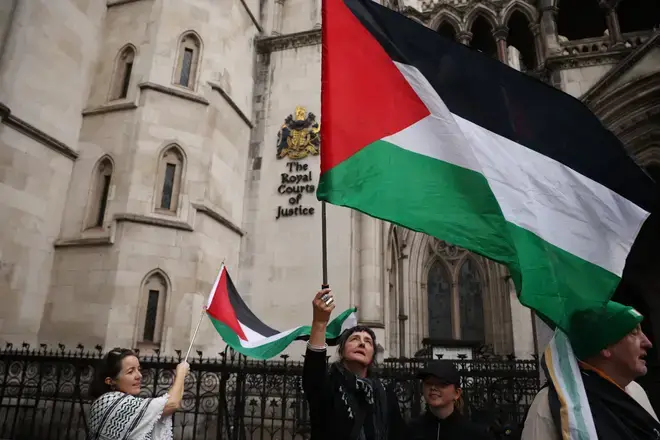Palestine Action have won their bid for a full legal challenge against the British government's decision to ban it as a terrorist group.
The High Court ruled that a number of grounds presented by Palestine Action arguing that the government's actions were unreasonable were upheld.
Giving a summary of his judgment this afternoon, Mr Justice Chamberlain said two parts of the challenge brought by Palestine Action co-founder Huda Ammori are "reasonably arguable".
One of these is whether the Home Secretary should have consulted the group before deciding to ban it.
The second relates to the ban's impact on freedom of expression and freedom of assembly.
The group was proscribed by Home Secretary Yvette Cooper on July 5, following the vandalism of two Voyager aircraft at RAF Brize Norton by a pair of Palestine Action members.
The ban meant the direct action group was added to a list of terror groups including the likes of al Qaeda, ISIS and Hezbollah.
Membership of, or support for, the group is now a criminal offence punishable by up to 14 years in prison.
But the High Court has ruled that the internal Home Office process that led to the ban was "not suitable", partly because "many people now subject to criminal proceedings".
It comes after at least 200 people have been arrested for showing support for the group after the ban came into effect.
After deliberating for over a week, the High Court decided let the legal challenge to the group's proscription proceed to a full judicial review hearing.
This hearing, which could lead to the group being de-proscribed, could take place as early as September.
Barrister Raza Husain KC, representing Ms Ammori, said the ban was “an authoritarian and blatant abuse of power” in court last week.
Was the Home Secretary right to ban Palestine Action?
Ms Ammori's lawyers argued the ban is having a chilling effect on freedom of speech and the right to protest in the UK, highlighting the high number of arrests made over people supposedly showing support for the group.
Mr Husain also made a fresh bid to temporarily block the ban on Wednesday, after an initial bid to do so failed on the eve of the ban coming into effect.
"We accept that we need to show a change of circumstances since the 4 July," he said, adding that there was an "extensive and real world impact" of the ban since it came into force.
The barrister said he was seeking "a stay on article two of the order…that's the article that proscribes Palestine Action".
If the judge grants the stay on this order, the ban on Palestine Action could be suspended immediately.
Ms Ammori said the "landmark decision" to grant a judicial review "demonstrates the significance of this case for freedoms of speech, expression and assembly and rights to natural justice in our country and the rule of law itself."
She added: "Our fundamental freedoms as citizens of this country are at stake, not just for those of us who have been directly affected and gagged by the ban, but as Justice Chamberlain said today, there has been a wider 'chilling effect on those wishing to express legitimate political views' as a result of the ban, making people fearful to speak out against Israel as it commits genocide and starves the Palestinian people to death."
The UN's high commissioner for human rights Volker Turk has previoiusly described the ban a "disturbing misuse" of counter-terror laws, calling the Home Office's order "disproportionate and unnecessary".

